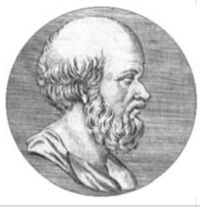
Eratosthenes
Happy Columbus Day to those who celebrate in the United States and Happy Thanksgiving to those in Canada.
On Columbus Day, it seems appropriate to consider the role of error in discovery. An updated repost.
While many of us were taught in school that Columbus proved that the world was round, that is a rather shoddy myth. The ancient Greeks understood that the world was round by the 6 century BCE.
Indeed the Libyan mathematician, Eratosthenes, calculated the circumference of the globe to be 250,000 stadia. Let’s put aside the fact that no one agrees on the length of a stadia, literally the length of a stadium. If one uses the Egyptian stadia, Eratosthenes’ estimate of 25,000 miles came within just 100 miles over the actual circumference at the equator (24,901 miles). Eratosthenes, in fact, made several mathematical errors but they cancelled out.
Eratosthenes was not the only one who calculated the circumference of the earth. Posidonius of Rhodes made his own calculation almost a century later and came up with a globe 6,000 miles smaller. Columbus took Posidonius circumference of 18,000 miles to justify his claim that the China and the Indies were only a few thousand miles to the west.
Would Columbus have sailed if he understood that the world is 6,000 miles larger than Posidonius calculated? That the Indies were closer to 9,000 miles from Europe rather than the 2,000 – 3,000 miles he claimed? Perhaps the lesson here is that on voyages of discovery, boldness may be preferable to certainty. What may matter is that we just keep sailing west.

That Columbus was an amazing navigator
Someone told him You can’t do that!
No street signs in the ocean
No clock, or longitude lines..
America, The best, people bike paths ships power plants computers Cars, steam engines cats birds everything..Thank-you C**2
My understanding is that he did quite a bit of sailing down the Atlantic to Africa and learned from those sailors about the routes crossing to the west that were closer and easier than further north.